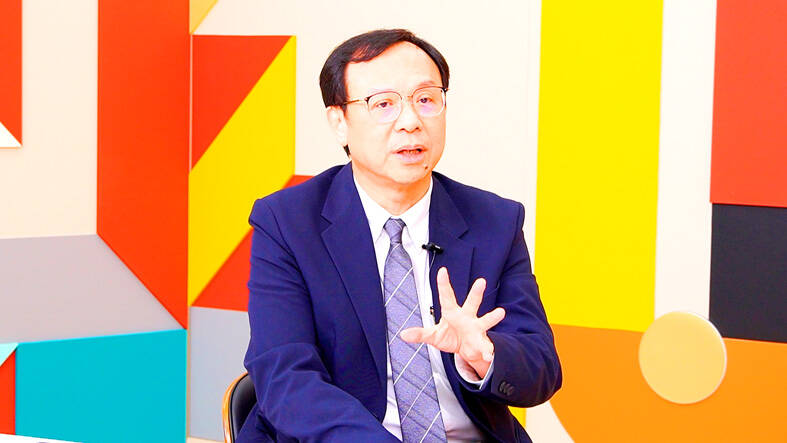The healthcare system is to analyze patient records and family histories using artificial intelligence (AI) to estimate the risk of developing diabetes or hyperlipidemia and improve early diagnoses, National Health Insurance Administration (NHIA) Director-General Shih Chung-liang (石崇良) said in an interview published yesterday.
The government has launched the Home-based Acute Care Program within two months after the inauguration of President William Lai’s (賴清德), in line with his “Healthy Taiwan” policy.
The NHIA has collaborated with Google to use AI to analyze healthcare big data, such as physical examinations, patient records and family histories, Shih said in an interview with the Liberty Times (sister paper of the Taipei Times).

Photo: Chang Chia-juei, Taipei Times
It would help grade the risks of different chronic diseases and predict morbidity rates of stroke or myocardial infarction in the following three to five years, he said.
The “Healthy Taiwan” policy also provides “hospitalization at home” for patients with acute infections, which Lai said would mark a milestone in Taiwan’s history of medicine, Shih said.
Home-based medical services would be used to focus on critical care cases, of which 25 to 30 percent would require hospitalization due to acute infections, Shih said, adding that elderly people living in long-term care facilities are facing similar situations.
The program is to respond to the needs of patients with acute conditions starting from this month, which has long been missing in home care and facility care, he said.
For example, nurses and doctors could visit patients at home or the facility to administer antibiotics when they have pneumonia or infections in their urinary tract or soft tissue, Shih said.
That would reduce the cross infection risk in hospitals and free up beds for other patients in need, thereby avoiding a medical system collapse due to epidemics, he said.
Shih also said the new version of the Rules of Medical Diagnosis and Treatment by Telecommunications (通訊診察治療辦法), which has been implemented from this month, would facilitate home-based acute care, as they have loosened restrictions on applicable users and prescriptions.
Patients’ vital signs could be transmitted to medical facilities via technologies such as wearable devices and smart mattresses for 24/7 monitoring, even though medical practitioners cannot provide bedside services at home, he said, adding that telemedical diagnosis performed by doctors and home visits by nurses would ensure satisfactory services for patients.
In addition to acute care, chronic care has been reinforced as well to include the 5.4 million patients with chronic diseases in Taiwan.
Eighty percent of people aged 65 or older in Taiwan have at least one chronic disease, with diabetes, chronic kidney disease, ischemic heart disease and stroke collectively accounting for about 20 percent, the largest proportion, Shih said, adding that what these chronic diseases have in common are “three highs” — high blood pressure, high blood lipids and high blood sugar.
The government has initiated the “888 project” to include at least 80 percent of people with three highs in the project, while providing them with consultations on their life habits and controlling 80 percent of their three high conditions, he said.

Taiwan is stepping up plans to create self-sufficient supply chains for combat drones and increase foreign orders from the US to counter China’s numerical superiority, a defense official said on Saturday. Commenting on condition of anonymity, the official said the nation’s armed forces are in agreement with US Admiral Samuel Paparo’s assessment that Taiwan’s military must be prepared to turn the nation’s waters into a “hellscape” for the Chinese People’s Liberation Army (PLA). Paparo, the commander of the US Indo-Pacific Command, reiterated the concept during a Congressional hearing in Washington on Wednesday. He first coined the term in a security conference last

Prosecutors today declined to say who was questioned regarding alleged forgery on petitions to recall Democratic Progressive Party (DPP) legislators, after Chinese-language media earlier reported that members of the Chinese Nationalist Party (KMT) Youth League were brought in for questioning. The Ministry of Justice Investigation Bureau confirmed that two people had been questioned, but did not disclose any further information about the ongoing investigation. KMT Youth League members Lee Hsiao-liang (李孝亮) and Liu Szu-yin (劉思吟) — who are leading the effort to recall DPP caucus chief executive Rosalia Wu (吳思瑤) and Legislator Wu Pei-yi (吳沛憶) — both posted on Facebook saying: “I

The Ministry of Economic Affairs has fined Taobao NT$1.2 million (US$36,912) for advertisements that exceed its approved business scope, requiring the Chinese e-commerce platform to make corrections in the first half of this year or its license may be revoked. Lawmakers have called for stricter enforcement of Chinese e-commerce platforms and measures to prevent China from laundering its goods through Taiwan in response to US President Donald Trump’s heavy tariffs on China. The Legislative Yuan’s Finance Committee met today to discuss policies to prevent China from dumping goods in Taiwan, inviting government agencies to report. Democratic Progressive Party Legislator Kuo Kuo-wen (郭國文) said

The Ministry of Economic Affairs has fined Taobao NT$1.2 million (US$36,900) for advertisements that exceeded its approved business scope and ordered the Chinese e-commerce platform to make corrections in the first half of this year or its license would be revoked. Lawmakers have called for stricter supervision of Chinese e-commerce platforms and more stringent measures to prevent China from laundering its goods through Taiwan as US President Donald Trump’s administration cracks down on origin laundering. The legislature’s Finance Committee yesterday met to discuss policies to prevent China from dumping goods in Taiwan, inviting government agencies to report on the matter. Democratic Progressive Party